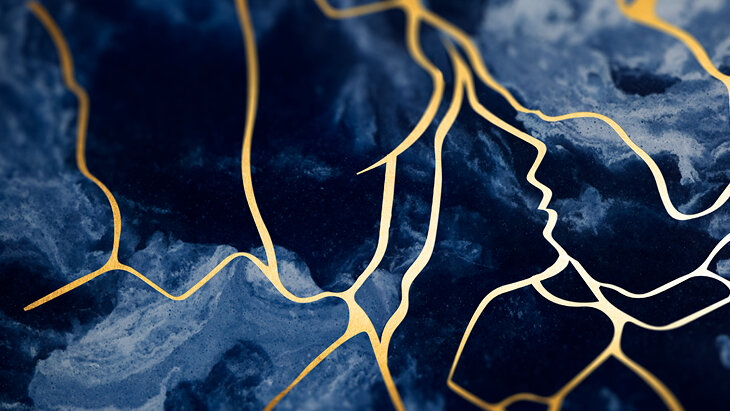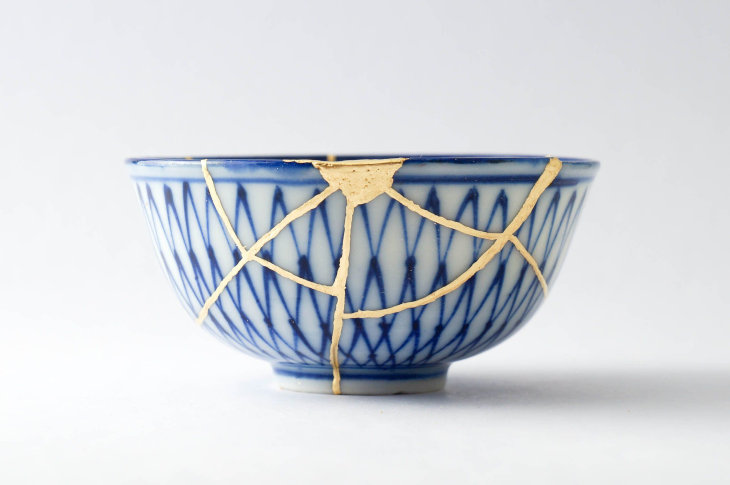 Passover’s Message of Hope in the Aftermath of Oct. 7
Passover’s Message of Hope in the Aftermath of Oct. 7


6 min read
What I learned from being honest about my struggle with alcohol.
Have you ever witnessed the beauty of a vessel repaired by Kintsugi?
There’s really nothing like it.
Kintsugi is a centuries-old Japanese art of mending broken objects with gold. By repairing these broken vessels with gold lacquer, the scars and cracks of the broken ceramic become the focus and turn the object into something unique and exquisite.
More exquisite than before it had ever been broken.
Your broken places make you stronger, wiser and more beautiful than ever before.
I first learned about the art of Kintsugi from Jewish educator, Adrienne Gold. She said, “When you think you’re broken, you can pick up the pieces, put them back together, and learn to embrace the cracks. Kintsugi teaches you that your broken places make you stronger, wiser and more beautiful than ever before.”
Sharing my struggles with gray area drinking brought home the truth about Kintsugi and its healing message for our world. The responses poured in (over 300 of them), each one unique and heartfelt, with one simple and surprising message: “Thank you for telling the truth.”
 The art of Kintsugi
The art of Kintsugi
No request for solutions. No quick fixes. People were describing their yearning to live in a world where people are honest with themselves and with others. A world where people tell the truth and show up as they really are, where we embrace our imperfections and struggles and refuse to bury our broken pieces underground.
A world without shame.
Shame is a toxic emotion that confuses us and makes us believe that the hurtful things we do are actually who we are.
We shift from thinking “I did something wrong” to “I am wrong.”
When we are in the grasp of shame we believe that our core is bad, defective and unlovable.
What’s the result? We believe we can only experience love and acceptance if we hide the shameful part of ourselves away. After all, if we don’t disguise who we really are we’ll be found out. Our true “unlovability” will be revealed!
So, a part of us goes underground, hidden away from view. We know we’re not being honest about our lives which in turn creates more shame. But we can’t shake the belief that this is what we must do if we want to keep the acceptance and love of the people in our world.
We dig down deeper underground. This is the vicious cycle of shame.
Celebrated author and shame researcher Brene Brown says it best:
Perfectionism is not the same as striving to be your best. Perfectionism is the belief that if we live perfect, look perfect and act perfect, we can minimize or avoid the pain of judgment and shame. It’s a shield. It’s a twenty-ton shield that we lug around thinking it will protect us when, in fact, it’s the thing preventing us from flight.
We live in a world of the curated image. Too many of us make the tragic error that by aiming for perfection we can hit greater highs, achieve more, become more. As humans we are wired to avoid rejection and secure approval, and we think being without flaw is the way.
Yet the research shows the exact opposite. Perfectionism sets us on the fast track to depression, anxiety, life paralysis and addiction. Plus, who enjoys being around a perfectionist? It only creates anxiety for those in their orbit.
Perfectionism sets us on the fast track to depression, anxiety, life paralysis and addiction.
Our hurtful places make us human – they are the broken pieces that become our friends and do not need to be feared or hidden away. When we truly understand this, we liberate ourselves to be real instead of perfect, to be honest instead of fake. To make mistakes and learn from them and embrace our struggles, knowing they are an essential part of the human experience. True learning, success and connection are the wonderful fruits of a life lived honestly.
This was the lesson that I learned in honestly sharing my story of dependence on alcohol. I was afraid I would lose the high regard of the people in my world. What would people think of me? My stomach clenched and my heart raced as I clicked send and hurled my truth into cyberspace.
I discovered that the very opposite was true. I had opened a window for people that vulnerability isn’t weakness, but strength. By showing up simply as I am, I confronted myself and gave others permission to confront themselves too.
It was the art of Kintsugi…in real time!
We stand at the threshold of the holiday of Shavuot, when we celebrate God’s giving of His Torah to the Jewish people at Mount Sinai. We received God’s Ten Commandments, the blueprint for living a life of goodness and moral clarity.
Those very tablets were shattered by Moses 40 days later upon descending the mountain and witnessing the terrible sight of the nation dancing around the idol of the golden calf.
What happened to all those shards?
Moses carefully picked up every one of those fragments and placed them in the Holy Ark, Judaism’s most sacred place, where they would be cradled alongside the second set of tablets the Jewish people received months later on Yom Kippur, the day of forgiveness.
Side by side the broken and the intact existed in holiness.
Side by side the broken and the intact existed in holiness as the Jewish people journeyed through the wilderness toward the Land of Israel.
We can’t reunite if we’ve never been separate. We can’t redeem what’s never been exiled. Without darkness there is no light. How can we repair if we’ve never broken down?
How can we move this truth from theory to action?
Consider choosing one trusted friend and speaking honestly about what you’re really going through. Ask them not to rush in to reassure, advise or offer solutions, simply to hold space for you to talk about yourself as you really are.
Could you do the same for your friend?
You might discover that your wholeness can only be crafted from your broken pieces. When you courageously show up in your truth, you’ll learn so much. Others will learn so much too. Compassion and connection will replace judgment, aloneness and shame. You’ll be more beautiful than ever.
